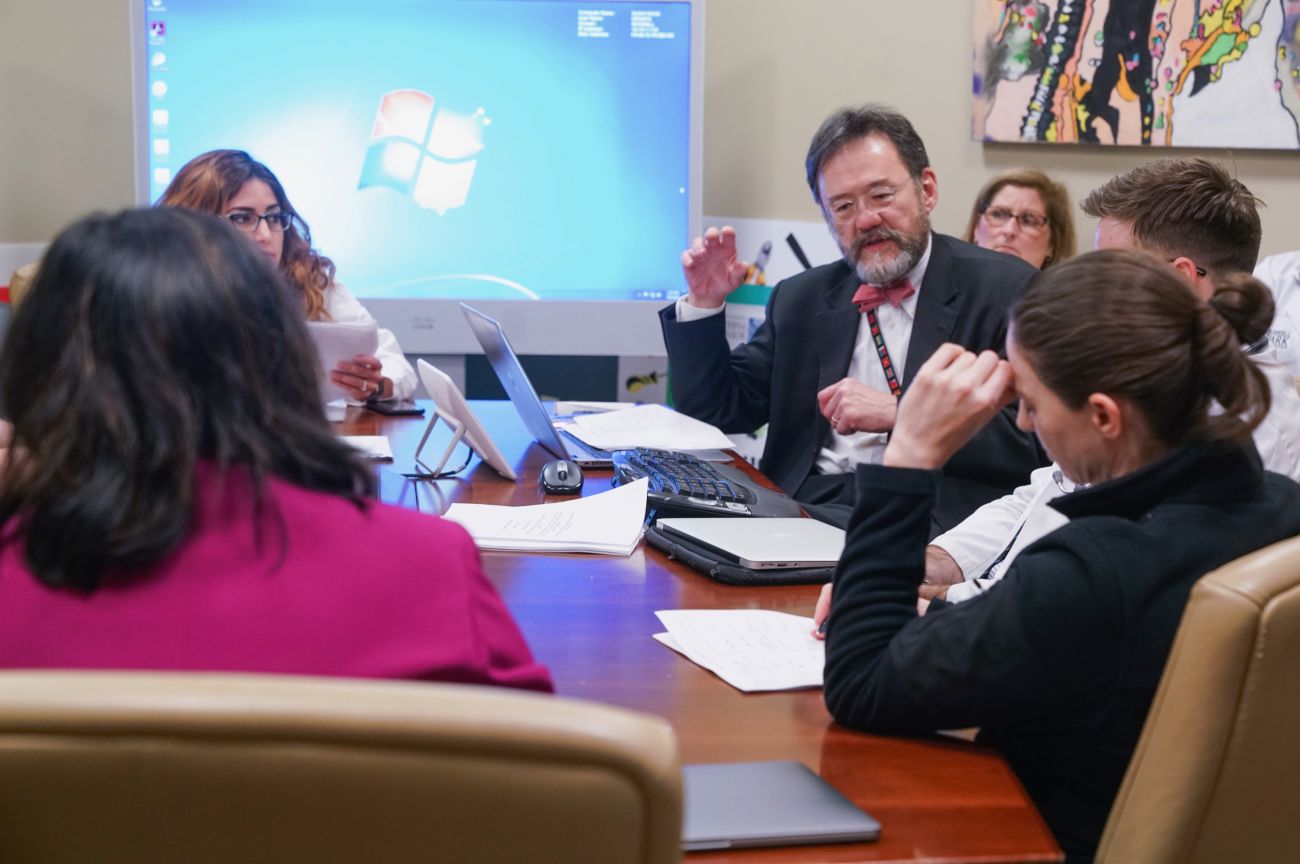Dozens of teams presenting new findings during American Society of Hematology’s 60th Annual Meeting
- Roswell Park presentations include studies on AML, transplant and lymphoma
- Findings highlight new treatments and new evidence on existing therapies
- Dr. Elizabeth Griffiths invited to give prestigious education program address
BUFFALO, N.Y. — Roswell Park Comprehensive Cancer Center hematology experts from many disciplines and subspecialties were invited to present new research at the American Society of Hematology (ASH) 60th Annual Meeting, which begins today and continues through Tuesday, Dec. 4, in San Diego, California. The dozens of research projects they will highlight include new research on management of aggressive and rare lymphomas, approaches for optimizing cellular therapies such as blood and marrow transplant, and decision-making around genomic testing for patients with acute myeloid leukemia.
A few key podium presentations from this year’s meeting are highlighted below.
Abstract 26: Maturing Clinical Profile of IMGN779, a Next-Generation CD33-Targeting Antibody-Drug Conjugate, in Patients with Relapsed or Refractory Acute Myeloid Leukemia
Saturday, Dec. 1, 7:45 a.m. PST
Seaport Ballroom F (Manchester Grand Hyatt San Diego)
Eunice Wang, MD, Chief of Leukemia at Roswell Park, was senior author on this study, which set out to determine the dose-limiting toxicity, safety, pharmacokinetics, pharmacodynamics, and preliminary antileukemia activity of IMGN779, a novel antibody-drug conjugate. The team will report that this agent continues to display manageable tolerability and antileukemia activity in patients with relapsed or refractory acute myeloid leukemia, or AML.
When to Obtain Genomic Data in AML and Which Mutations Matter (Education Program)
Session: Acute Myeloid Leukemia: Moving Beyond 7+3
Saturday, Dec. 1, 7:30 a.m. PST and
Saturday, Dec. 1, 2 p.m. PST
Hall AB (San Diego Convention Center)
Elizabeth Griffiths, MD, will be the first of three experts to present during this education program focused on new approaches for treating and managing acute myeloid leukemia, or AML. Her talk will review how mutational profiling can help to define disease biology and guide treatment selection for both newly diagnosed AML patients and those whose leukemia has relapsed, covering both new evidence and best practices.
Abstract 249: Risk Factors for the Development of Cutaneous Melanoma after Allogeneic Hematopoietic Cell Transplantation
Saturday, Dec. 1, 4:30 p.m. PST
Grand Hall B (Manchester Grand Hyatt San Diego)
While advances in clinical practice for allogeneic hematopoietic cell transplantation, a potentially curative treatment for many hematologic malignancies, have led to substantial improvements in outcomes, transplant recipients are at risk for a number of post-transplant complications, including the development of melanoma or other cancers, note Megan Herr, PhD, Assistant Professor of Oncology and a clinical epidemiologist with Roswell Park’s Transplant and Cellular Therapy Program, and co-authors.
The team set out to identify risk factors for developing melanoma after allogeneic transplant and to evaluate the relationship between melanoma and conditioning regimens or factors associated with immune suppression/dysfunction. “In the largest study to date of melanoma risk factors following allogeneic HCT,” Dr. Herr and co-authors note, “we report novel associations with specific conditioning regimens, occurrence of acute and chronic graft-versus-host disease, and occurrence of keratinocyte carcinoma. Our results emphasize the importance of adherence to current surveillance guidelines for HCT recipients, specifically routine skin examination, heightened skin cancer awareness, and photoprotection recommendations, particularly for those survivors at highest risk.”
Abstract 451: Outcomes of Patients with Limited-Stage Aggressive Large B-Cell Lymphoma with MYC Rearrangement with and without BCL2 and/or BCL6 Rearrangements: A Retrospective Analysis from 15 US Academic Centers
Sunday, Dec. 2, 4:30 p.m. PST
Ballroom 20D (San Diego Convention Center)
Shalin Kothari, MD, a Roswell Park Hematology-Oncology Fellow at Roswell Park, will present new findings on treatment of two aggressive subtypes of diffuse large B-cell lymphoma (DLBCL), both of which are typically treated with intensive “R-CHOP” chemotherapy: “double-hit” lymphoma and MYC-rearranged large cell lymphoma. In order to add to the limited data on best approaches for treating patients with aggressive lymphomas that are restricted to just one or two sites in the body, Dr. Kothari and senior author Pallawi Torka, MD, spearheaded a multi-institutional effort to compile data on 100 patients with this rare form of cancer.
###
Roswell Park Comprehensive Cancer Center is a community united by the drive to eliminate cancer’s grip on humanity by unlocking its secrets through personalized approaches and unleashing the healing power of hope. Founded by Dr. Roswell Park in 1898, it is the only National Cancer Institute-designated comprehensive cancer center in Upstate New York. Learn more at www.roswellpark.org, or contact us at 1-800-ROSWELL (1-800-767-9355) or ASKRoswell@RoswellPark.org.
Annie Deck-Miller, Senior Media Relations Manager
716-845-8593; annie.deck-miller@roswellpark.org
